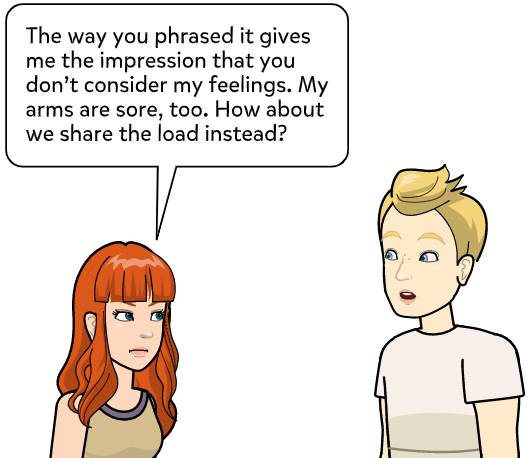Title: Evaluating Relationships: The 2-Second Litmus Test
Written on
Chapter 1: Understanding Relationship Dynamics
At times, a relationship can be detrimental, even in the absence of overt problems.

Created by the author
Even as a child of eight, I sensed that something was amiss, though I couldn't clearly express my feelings at that time. During a week-long visit to my uncle and aunt, I overheard a seemingly harmless comment from my uncle to my aunt.
He remarked, “This bag is heavier; I’ll let you carry it because I’m worried about hernias.” I found this puzzling. Why did it seem off? It struck me that my brother says a similar thing when we shop together, but his phrasing shifts to, “This bag is heavier; I’ll carry it since it’ll be tough for you.”
Once I recognized that my uncle’s reasoning was inverted, I began to observe his behavior more closely. He would often say things like, “This toast is a bit burnt; you can have it since burnt food upsets my stomach.” It turned into a peculiar game for me, noting how my uncle would phrase requests to always benefit himself, often stating things at least six times daily to ensure his comfort.
This pattern extended beyond trivial matters; it reflected a deeper imbalance. For example, when both he and my aunt had work commitments, he would always prioritize his over hers, believing his job to be more significant.
Years later, I only recalled these moments when my aunt unexpectedly announced her desire for a divorce. My parents were taken aback. The couple rarely argued, had built a thriving business together, and my uncle often expressed his love publicly, showering my aunt with lavish gifts. To outsiders, they appeared to be the perfect couple.
Section 1.1: The Surprising Revelation
“Why now?” my mother asked, voicing what everyone was thinking, considering their marriage had spanned over 25 years.
“Did you have a significant fight?”
“No…” my aunt hesitated. “This might sound trivial.”
My mother listened closely.
“Well, I’ve been having lunch with a new colleague lately. She’s a huge foodie, and we always share our dishes.”
“Every time, she gives me the better portion. If there are two pieces of crab, she hands me the larger one. If there are three dumplings, I get two. It’s such a nice feeling! I hadn’t realized how much I missed someone prioritizing my feelings.”
“I took Max to one of our favorite spots recently. He took the larger piece and the two dumplings, even knowing I love the one with extra cream.”
“That lunch wasn’t nearly as enjoyable. The realization that I had been sacrificing moments of joy for over two decades hit me hard!”
In that moment, my mother grasped the situation. “You’re right. It’s time. It’s been too long.”
Subsection 1.1.1: Avoiding Long-Term Regrets
Don’t make the same mistake as my aunt; don’t wait 25 years for an epiphany about what you’ve been missing.
Section 1.2: The Challenge of Departure
Many find it difficult to leave relationships without clear red flags. When faced with abuse or infidelity, the path forward is usually evident. Friends and family often support you in moving on. However, when the signs are subtle and the relationship has its positive aspects, walking away becomes a significant struggle.
Are these behaviors insurmountable in a relationship? Not at all. Should you attempt to address them? Absolutely.
Even now, I don’t believe my uncle intended to be anything but a caring husband. Perhaps he simply lacked self-awareness or was modeled relationships that way. Perhaps my aunt could have voiced her feelings regarding his behavior with greater consistency and clarity.
Ultimately, whatever gestures he offered proved insufficient to salvage their marriage. However, your relationship does not have to follow the same fate.
Chapter 2: Taking Action
Fortunately, the steps you can take are relatively straightforward:
- Assess — Reflect on the key relationships in your life. Consider not just romantic ties but also those with family and friends. Do they pass the litmus test? Do they prioritize their needs above yours?
- Communicate — Many individuals overlook instances like my uncle's behavior because they seem minor. However, expressing to the other person how frequently these behaviors occur can help them understand their impact on your feelings and the relationship.

Created by the author
Be mindful that someone who acts selfishly may not respond well to feedback. Focus on specific behaviors (“The way you said that…”) rather than labeling them (“You are selfish!”).
Takeaway
To help contextualize why seemingly minor actions matter, consider this: there are 365 days in a year, and if you eat three meals daily, that totals 1,095 meals a year and 10,950 meals over a decade. Do you want to have 10,950 experiences of feeling overlooked?
Life is often more complex than we wish it to be. Sometimes, we discover that those who fail the litmus test are our long-term partners, close family members, or even our oldest friends.
I’m not advocating for immediate severance; rather, we should strive for open communication. It’s possible that nothing will change, and the relationship may still hold value, but at least we’d be making a conscious decision rather than being taken by surprise after 25 years.
“The way people treat us is based on the permission we give them.” — Sam Qurashi
If you wish to learn how to connect more authentically, subscribe to my mailing list to receive the top five questions for fostering intimacy along with other regular insights.